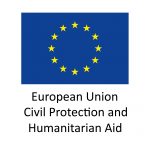Do you remember the nervous excitement of going back to school after summer? How as a child you got ready in the morning with all your new books, maybe your mother even made you wear your nicest clothes?
This year, more than 330,000 children in Burkina Faso are missing out on this moment of joy. No proud posing in front of the parents, no nervous excitement. More than 9,000 teachers won’t be able to return to work. A total of 2,024 schools are closed and there is no hope in sight that they will reopen any time soon.
Education has become a strategic target in Burkina Faso. Fighters affiliated to armed groups in the Sahara have made their way south into Burkina Faso where schools are now attacked, burnt or even occupied for military purposes or by displaced families. Parents fear for their children because they are attacked on the way to school and at school.
Burkina Faso isn’t the only country where it is too dangerous to go to school. Escalating armed violence and insecurity across West and Central Africa, particularly in the Sahel region, is preventing more than 2 million children from going to school to learn and develop like they should be.
With people fleeing the violence to safer parts of Burkina Faso for their survival, education is not the most pressing concern. But especially a continuous education is essential for the protection and healthy development of girls and boys affected by crises. Quality education provides a protective environment for children andenables them to build a better future. If we do not ensure that children can continue to have access to education, we risk a generation of children and youth not fully realising their potential.
Save the Children in Burkina Faso is working to give children in the Sahel a chance to continue learning, despite the emergency. With financial support from the European Union (DG ECHO), Save the Children is equippingcommunities with the skills and knowledge to provide a non-formal form of education to their children. No classroom, no books, no blackboards – nothing that resembles traditional education and that could attract the attention of armed groups.
With interactive games and singing, Save the Children is pioneering an innovative, low-profile approach to education to allow Burkina Faso’s children to continue to learn and develop at the heart of their communities. With the help of selected and trained community members instead of teachers, children gather in informal protective learning spaces where they can learn by playing and connect with their peers.
By empowering these conflict-affected communities, Save the Children can help lower the devastating impact of the violence on the younger generations’ academic and psychosocial development. But this is not an easy undertaking and it will be a struggle without greater support, given that Education in Emergencies programmes in West and Central Africa remain severely underfunded.
This must not become a forgotten crisis. Systemic solutions are urgently needed to ensure children can continue their learning, to prevent another generation from being lost.


Elisabeth Krumm
EU Programme Support Officer, Burkina Faso
Save the Children
